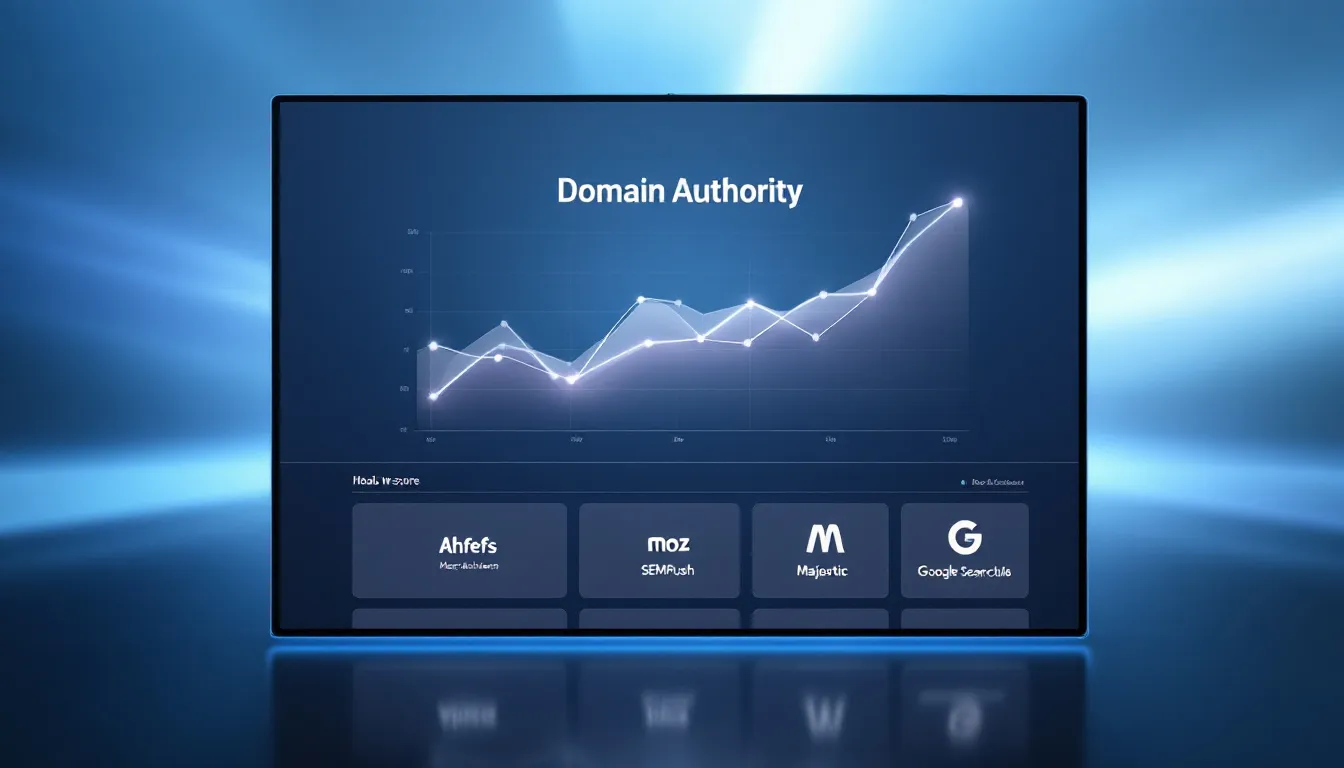An authority website is a trusted source of information that stands out due to its credibility and comprehensive content. People and search engines alike recognize it as a reliable resource. Many search for ways to build such authority to enhance their online presence. In this guide, we’ll explore what an authority site is, why it matters for SEO, and how to build one successfully.
Key Takeaways
- An authority website is recognized for its trustworthy, comprehensive content, which boosts brand recognition and drives audience engagement.
- Improving website authority is essential for enhancing SEO performance, as it leads to higher search rankings and better organic traffic through quality content and a robust backlink profile.
- Key metrics like Domain Rating, Authority Score, and Domain Authority provide insights into a website’s credibility, guiding strategies for building and maintaining authority effectively.
What is an Authority Website?
An authority site is a trusted site by users, experts, and other websites, serving as a primary resource for industry-specific information on a web page. Generally speaking, it is a measure of a website's ability to attract organic traffic and its correlation with domain rating, which ultimately serves the users’ needs – the ultimate goal of good Google search results. These websites are recognized by search engines for their reliable and comprehensive content, demonstrating expertise and a broad measure of trustworthiness. Examples of such authoritative websites include major news publishers like Wikipedia, the Financial Times, and other well-known sources.
An authority website greatly boosts brand recognition and audience engagement by providing trusted, educational content. Consistent visits from users and industry experts indicate high credibility and influence. This trust translates into greater engagement, higher conversion rates, and ultimately, more authority in a successful online presence.
Why Authority Websites Matter for SEO
Website authority is key for high rankings, as Google needs to trust the site. Improving a website’s authority enhances search engine rankings and attracts organic traffic. A website's ability to attract organic traffic is influenced by its domain rating and overall authority. Content quality, backlink profile, and user engagement are crucial in determining a site’s authority. Benefits of authoritative websites include higher search visibility, increased brand awareness, and a larger audience. Establishing topical authority can lead to increased organic traffic as higher website authority translates to better visibility.
Google likely measures website authority based on the quality and strength of the backlink profile. Accordingly, it shows the top sites on its Search Engine Results Page, or SERP. Links from authority websites act as votes of confidence and lead to higher rankings, making high-quality, relevant backlinks essential. Lower bounce rates, which indicate better authority, show that audiences engage more when content is helpful.
Outranking competitors with higher authority scores is challenging. Authority, a key feature in Google’s ranking algorithm, was the focus of Larry Page’s PhD thesis. Audience-centric content is fundamental for enhancing online authority.
Websites with strong topical authority achieve superior search rankings. Therefore, focusing on high-quality content and a strong backlink profile is crucial for improving SEO performance.
Key Metrics to Measure Website Authority
Authority metrics assess website credibility and strength, helping businesses understand their digital standing. Major tools like Semrush, Ahrefs, and Moz use different algorithms to calculate site authority.
Domain Rating (DR) measures the quantity and quality of external backlinks on a scale from 0 to 100, with higher scores indicating greater domain authority. These metrics reflect a website's ability to attract organic traffic and perform well in search rankings. Ahrefs considers backlinks, unique linking domains, and domain authority in its calculations.
Semrush’s Authority Score (AS) is a manipulation-resistant ranking metric, working on a scale from 0 to 100. Comparing Domain Ratings among competitors can reveal strategic insights for enhancing authority, even if a low Domain Rating surpasses competitors in the same niche. Utilizing these tools can guide enhancements to your website’s backlink profile, ultimately solidifying its authority status.
Moz’s Open Site Explorer evaluates website authority through its Domain Authority score, based on factors like inbound link volume. Each tool provides unique insights and metrics to help understand and improve website authority.
How Search Engines Evaluate Authority
Search engines like Google use a sophisticated algorithm to evaluate a website’s authority, ensuring that only the most credible and trustworthy sites rank highly in search engine results pages (SERPs). This evaluation process involves several key factors:
- Domain Authority: One of the primary metrics search engines use is domain authority. This score reflects the overall credibility and trustworthiness of a website. A higher domain authority indicates a more authoritative site, which is more likely to rank well in search engine results.
- Backlink Profile: The quality and quantity of backlinks pointing to a website are crucial indicators of its authority. Search engines prioritize links from reputable sources, such as other authority sites, news outlets, and educational institutions. These backlinks act as votes of confidence, signaling to search engines that the content is valuable and trustworthy.
- Content Quality: High-quality, relevant content is essential for establishing a website’s authority. Search engines look for well-researched, informative, and engaging content that provides real value to users. This includes comprehensive articles, detailed guides, and up-to-date information that addresses users’ needs and queries.
- User Experience: A positive user experience is another critical factor in search engine evaluations. This includes aspects such as page speed, mobile responsiveness, and intuitive navigation. Websites that load quickly, are easy to navigate, and provide a seamless experience across devices are more likely to be favored by search engines.
- Social Signals: Social signals, such as likes, shares, and comments on social media platforms, can also contribute to a website’s authority. While not as heavily weighted as other factors, strong social engagement can indicate that content is resonating with users, further enhancing its perceived value and authority.
By understanding and optimizing these factors, you can improve your website’s authority, making it more likely to rank higher in search engine results and attract organic traffic.
How to Build an Authority Website
Consistent publication of high-quality content improves link acquisition from established websites. Prioritize producing valuable content over artificially inflating authority metrics. Focus on long-term strategies, like optimizing specific points and building a strong backlink profile, to increase website authority. This can lead to more traffic and better rankings against competitors. These strategies enhance a website's ability to attract organic traffic and improve search rankings.
A travel website increased its organic traffic from 550 to over 66,000 visitors per month by implementing a strategic link-building campaign. Effective link-building strategies can be both numerous and diverse, allowing for tailored approaches based on sites link niche sites.
Therefore, creating valuable content and building a solid backlink profile is vital for long-term success.
Content Creation Strategies
Audience-focused content is key to enhancing website authority. Content should match or exceed the quality of authority sites to attract links. A good rule of thumb for content publication is to only publish what you’d be happy to read yourself. Engaging content should be detailed, easy to read, well-formatted, and include high-quality images. Regularly publishing relevant, entertaining, and helpful content increases the chances of getting links from authority sites.
Spend time on prep work to ensure content meets quality standards. Understanding the industry state and audience interests is crucial for informed content decisions. A travel website’s keyword rankings surged from 6,200 to over 99,000 due to enhanced authority and targeted content strategies.
Many website owners mistakenly focus solely on acquiring links, ignoring content quality. Prioritizing quality content creation is crucial for building an authority website.
White hat and black hat techniques
White hat SEO involves ethical practices that align with search engine guidelines, while black hat SEO uses manipulative tactics that violate these rules. White hat techniques focus on user value and compliance, while black hat techniques aim to deceive search engines for higher rankings.
The following subsections will delve into the importance of avoiding black hat strategies, effective link-building techniques, enhancing user experience, and other common mistakes to avoid in building website authority.
Avoiding black hat strategies
Using black hat techniques can lead to penalties from search engines, affecting a website’s ranking and visibility. Google stresses the importance of adhering to quality guidelines to prevent adverse effects. Manipulative SEO practices can result in severe penalties, including removal from search results, as search engines actively punish non-compliant tactics.
Black hat techniques like keyword stuffing and hidden text aim to deceive search engines rather than provide genuine value. These strategies may yield short-term gains but jeopardize long-term success due to search engine updates designed to eliminate such practices.
Common black hat tactics, such as link farms and private blog networks, aim to artificially boost website authority. Ethical SEO practices foster trust with potential customers, while black hat methods can damage brand reputation and credibility.
What to do instead: Effective Link Building Techniques
Link building involves getting authoritative and reputable websites to link to your pages, enhancing credibility and search rankings. Earning high-quality backlinks is essential for increasing website authority. Effective link building involves creating valuable content that naturally encourages reputable sites to link back. Acquiring high-quality backlinks enhances a website's ability to attract organic traffic and improve its authority. Strategies should focus on acquiring backlinks from high-authority sites to enhance credibility.
Backlinko earned over 5,600 quality backlinks in 30 days through strategic link building. A travel website improved its domain rating from 18 to 37 in six months by using guest posts and link insertions. Evenly distributing link equity across target pages significantly contributed to the travel website’s authority growth.
Using HARO outreach along with guest posts enhanced the travel brand’s visibility in competitive markets. To improve Domain Rating, obtaining backlinks from unique referring domains is crucial. Analyzing competitors’ DA scores can help improve your own website’s authority.
Ahrefs’ Domain Rating is useful for evaluating link prospects, serving as a good proxy for quality. Effective link building can produce quick results. Companies like Bloomberg, Inc., and Business Insider have successfully provided links through effective strategies.
Enhancing User Experience (UX)
A positive user experience is vital for retaining visitors and encouraging engagement. User engagement metrics are crucial indicators of a site’s authority and can influence ranking potential. A high bounce rate can occur if users struggle with navigation or readability, regardless of content value. Improving website navigation enhances user satisfaction and interaction.
Technical SEO addresses factors impacting user experience, such as website security, architecture, and page speed. A well-designed site prioritizing user experience significantly affects visitor interaction and return likelihood.
Fast loading times and easy navigation are crucial for a positive user experience. Enhancing UX leads to better user engagement and higher rankings.
Other common Mistakes to Avoid in Building Website Authority
SEO professionals often mistakenly believe website authority is the sole aim. A common link-building mistake is relying solely on Domain Authority or Domain Rating. Artificially boosting authority metrics can lead to Google penalties. Focusing on a well-researched SEO plan is more important than chasing authority. Prioritize execution for better results. If top content isn’t yielding results, check the website’s UX design.
Focusing solely on authority metrics like Domain Authority, rather than content quality, can hinder growth. Neglecting user intent while building links leads to ineffective strategies that fail to engage your audience. Avoiding these mistakes will help build a more effective and sustainable authority website.
Tools to Check Your Website's Authority
Utilizing specific tools is essential for assessing and enhancing website authority. Moz’s Open Site Explorer evaluates authority through its Domain Authority score. Ahrefs provides a website authority checker tool using Domain Rating, based on backlink quality and quantity. SEMrush’s Authority Score ranges from 0 to 100, indicating the quality of a site’s backlink profile, with higher scores signifying better authority.
Ahrefs’ Domain Rating uses a logarithmic scale, making high scores harder to achieve, but it remains a useful authority indicator. SEMrush offers a free website authority checker tool, providing insights tailored to the Authority Score.
Leveraging these tools can guide enhancements to your website’s backlink profile, solidifying its authority status.
Case Studies of Successful Authority Websites
Successful authority websites like Wikipedia and Financial Times are recognized for expert insights, trusted content, and robust traffic, highlighting the importance of quality and trustworthiness in digital success. These websites engage users with diverse content types like articles, videos, and infographics, catering to various preferences. They maintain a consistent publishing schedule to establish credibility and keep their audience informed.
Successful authority websites commonly focus on audience engagement, continual content improvement, and leveraging social proof through testimonials and case studies. Studying these examples provides valuable insights into the strategies and practices that contribute to building a highly authoritative website.
Summary
In summary, building an authority website in 2025 requires a strategic approach that includes creating high-quality content, employing ethical SEO practices, and focusing on user experience. By understanding the importance of website authority and utilizing the right tools and metrics, you can enhance your site’s credibility and search engine rankings.
Remember, the journey to becoming an authority site is long-term and requires consistent effort and dedication. By avoiding common mistakes and continuously improving your content and user engagement, you can build a website that not only ranks well but also earns the trust and loyalty of your audience.
Frequently Asked Questions
What is an authority website?
An authority website is a reliable and trusted source recognized by users, experts, and other sites, providing valuable information within a specific industry. Its reputation stems from quality content and expertise, making it a go-to resource for relevant information.
Why is website authority important for SEO?
Website authority is crucial as it directly impacts search engine rankings, determined by content quality and the strength of the backlink profile. Higher authority leads to better visibility and increased trust among users. This is the case for online businesses that rely on traffic and conversion, for small businesses that want to attract local results for example on Google Maps, and even for social media influencers!
How can I improve my own site's authority?
Effective link-building techniques such as guest posting, HARO outreach, and producing high-quality content can significantly enhance your website's authority. By engaging in these strategies, you can encourage reputable sites to link back to yours, improving your online presence.
What tools can I use to check my website's authority?
To check your website's authority, utilize tools such as Moz's Open Site Explorer, Ahrefs, and SEMrush for comprehensive analysis and improvement.
What are some common mistakes to avoid when building website authority?
To build website authority effectively, avoid solely concentrating on authority metrics, neglecting user intent, and engaging in black hat SEO practices. These missteps can undermine your site's credibility and growth.






